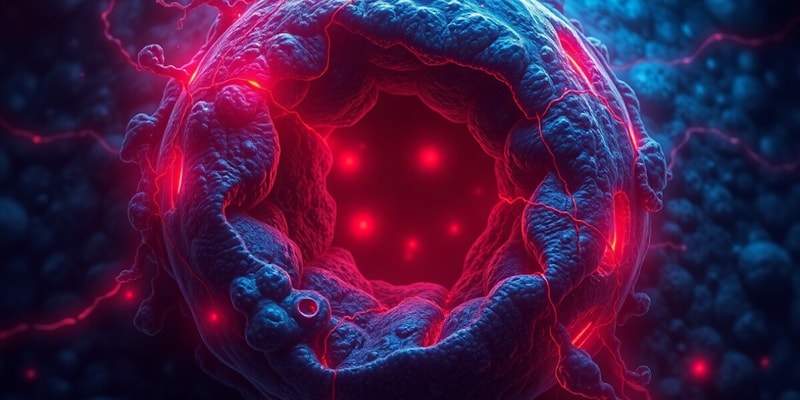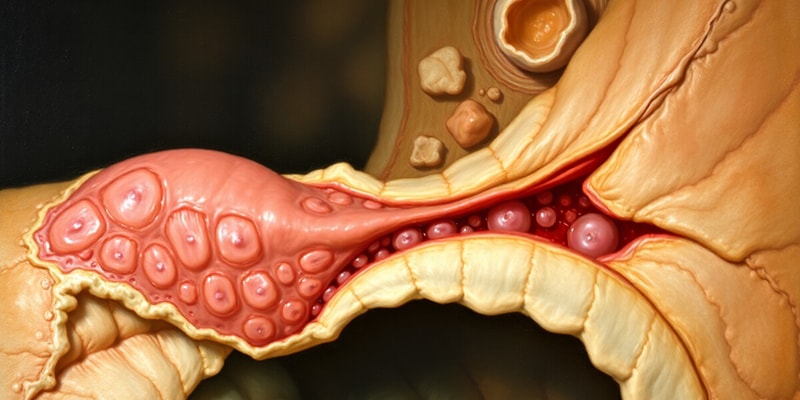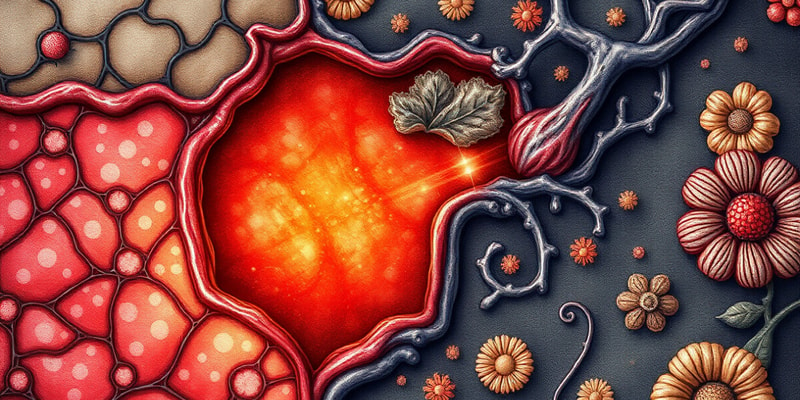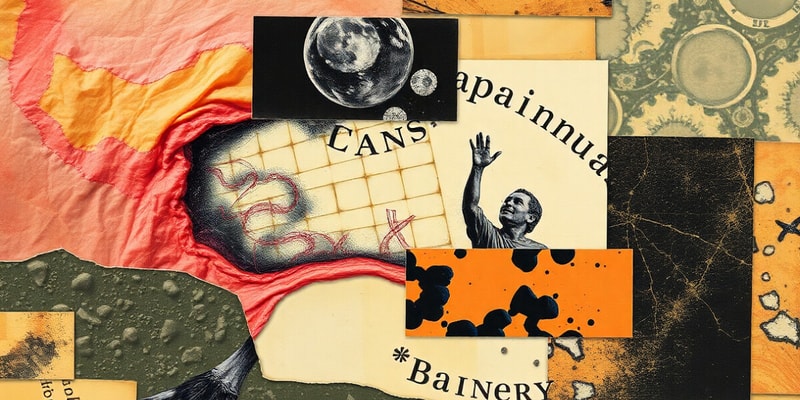Podcast
Questions and Answers
What type of healing is primarily associated with gastric erosions?
What type of healing is primarily associated with gastric erosions?
Which factors can delay the normal healing process of bone fractures?
Which factors can delay the normal healing process of bone fractures?
What is the nature of healing associated with gastric ulcers?
What is the nature of healing associated with gastric ulcers?
What effect does aging have on wound healing?
What effect does aging have on wound healing?
Signup and view all the answers
Which condition leads to abnormal or delayed healing due to tissue vascularity issues?
Which condition leads to abnormal or delayed healing due to tissue vascularity issues?
Signup and view all the answers
What is the primary nutritional concern that affects collagen synthesis in wound healing?
What is the primary nutritional concern that affects collagen synthesis in wound healing?
Signup and view all the answers
What complication is associated with excessive cortical bone erosion during fracture repair?
What complication is associated with excessive cortical bone erosion during fracture repair?
Signup and view all the answers
How does denervation impact wound healing?
How does denervation impact wound healing?
Signup and view all the answers
Which of the following is a common challenge in achieving normal healing of the liver?
Which of the following is a common challenge in achieving normal healing of the liver?
Signup and view all the answers
What is a key factor in the healing of mal-union or non-union of fractures?
What is a key factor in the healing of mal-union or non-union of fractures?
Signup and view all the answers
What is the primary reason for keeping a wound open for 4-7 days during tertiary intention healing?
What is the primary reason for keeping a wound open for 4-7 days during tertiary intention healing?
Signup and view all the answers
Which growth factor is primarily responsible for inducing new blood vessel formation during the angiogenesis phase of wound healing?
Which growth factor is primarily responsible for inducing new blood vessel formation during the angiogenesis phase of wound healing?
Signup and view all the answers
What characterizes granulation tissue during the healing process?
What characterizes granulation tissue during the healing process?
Signup and view all the answers
In the context of scar formation, which cells are primarily involved in the laying of connective tissue over granulation tissue?
In the context of scar formation, which cells are primarily involved in the laying of connective tissue over granulation tissue?
Signup and view all the answers
What occurs in the second stage of scar formation during wound healing?
What occurs in the second stage of scar formation during wound healing?
Signup and view all the answers
Which type of wound healing involves the least amount of tissue loss and is characterized by minimal scarring?
Which type of wound healing involves the least amount of tissue loss and is characterized by minimal scarring?
Signup and view all the answers
What are the main cells involved in tissue repair during the inflammatory phase of wound healing?
What are the main cells involved in tissue repair during the inflammatory phase of wound healing?
Signup and view all the answers
Which phase of wound healing is primarily characterized by collagen deposition and granulation tissue formation?
Which phase of wound healing is primarily characterized by collagen deposition and granulation tissue formation?
Signup and view all the answers
Which of the following factors is least likely to affect wound healing?
Which of the following factors is least likely to affect wound healing?
Signup and view all the answers
What complication may arise from delayed wound healing due to insufficient tissue repair?
What complication may arise from delayed wound healing due to insufficient tissue repair?
Signup and view all the answers
Which therapeutic intervention is primarily used to enhance the formation of granulation tissue during the proliferative phase?
Which therapeutic intervention is primarily used to enhance the formation of granulation tissue during the proliferative phase?
Signup and view all the answers
Which type of intention healing typically results from surgical intervention with direct closure of the wound?
Which type of intention healing typically results from surgical intervention with direct closure of the wound?
Signup and view all the answers
Which cellular mechanism is crucial for the remodeling and maturation phase of wound healing?
Which cellular mechanism is crucial for the remodeling and maturation phase of wound healing?
Signup and view all the answers
What is a characteristic feature of a keloid compared to a hypertrophic scar?
What is a characteristic feature of a keloid compared to a hypertrophic scar?
Signup and view all the answers
Which complication is most commonly associated with wound dehiscence occurring 5-10 days after suturing?
Which complication is most commonly associated with wound dehiscence occurring 5-10 days after suturing?
Signup and view all the answers
In the context of wound healing, what does secondary intention primarily involve?
In the context of wound healing, what does secondary intention primarily involve?
Signup and view all the answers
Which statement about pathological wound healing is accurate?
Which statement about pathological wound healing is accurate?
Signup and view all the answers
What role does nutritional status play in wound healing?
What role does nutritional status play in wound healing?
Signup and view all the answers
Which mechanism of wound healing typically leads to the formation of scar tissue?
Which mechanism of wound healing typically leads to the formation of scar tissue?
Signup and view all the answers
Which of the following is not a stage of wound healing?
Which of the following is not a stage of wound healing?
Signup and view all the answers
When managing wound dehiscence, what therapeutic intervention is typically employed?
When managing wound dehiscence, what therapeutic intervention is typically employed?
Signup and view all the answers
What could be a sign of delayed wound healing in a diabetic foot infection?
What could be a sign of delayed wound healing in a diabetic foot infection?
Signup and view all the answers
What is commonly seen in proud flesh during the wound healing process?
What is commonly seen in proud flesh during the wound healing process?
Signup and view all the answers
What is the primary focus of healing by primary intention?
What is the primary focus of healing by primary intention?
Signup and view all the answers
Which cell type is primarily responsible for wound contraction during healing?
Which cell type is primarily responsible for wound contraction during healing?
Signup and view all the answers
What characterizes wounds that heal by secondary intention?
What characterizes wounds that heal by secondary intention?
Signup and view all the answers
What is a potential complication in the healing process associated with intense inflammation?
What is a potential complication in the healing process associated with intense inflammation?
Signup and view all the answers
In which phase of healing does angiogenesis primarily occur?
In which phase of healing does angiogenesis primarily occur?
Signup and view all the answers
What therapeutic intervention might enhance the healing process in wounds healing by secondary intention?
What therapeutic intervention might enhance the healing process in wounds healing by secondary intention?
Signup and view all the answers
Which of the following options best describes a dehisced wound?
Which of the following options best describes a dehisced wound?
Signup and view all the answers
How does minimal inflammation affect tissue healing?
How does minimal inflammation affect tissue healing?
Signup and view all the answers
What is a key characteristic of wounds with healing by primary intention?
What is a key characteristic of wounds with healing by primary intention?
Signup and view all the answers
What role do fibroblasts play in the healing process?
What role do fibroblasts play in the healing process?
Signup and view all the answers
Study Notes
Wound Healing and Repair
- Wound healing is the restoration of tissue architecture and function after an injury.
- It's crucial for survival, eliminating the cause of injury (e.g., pathogens, toxins, or autoimmune complexes).
- Healing aims to restore the structure and function to normal.
- Terms like repair, regeneration, restoration, and restitution describe the process.
- A damaged tissue is considered a wound.
Elements of Tissue Repair
- Cells: Crucial components of tissue repair.
- Cytokines and Growth Factors (GFs): Proteins that control healing.
- Extracellular matrix (ECM): A network of proteins supporting healing.
Session Objectives
- Review wound healing (tissue repair) background and definition.
- Identify cells, growth factors, and ECM in tissue repair.
- Explain healing mechanisms (i.e., primary, secondary, tertiary intention).
- Understand scar formation processes.
- Analyze factors impacting wound repair.
- Summarize examples of dysfunctional wound repair.
Learning Outcomes
- Students will describe the pathophysiology of wound healing and repair.
- Osteoporosis case studies are included.
Types of Healing
- Primary intention: Minor, clean incisions where tissue edges are close together. Healing is relatively fast, with minimal scarring.
- Secondary intention: Larger wounds, with edges not approximated, leading to more extensive scarring and a longer healing process.
- Tertiary Intention: Wounds that are cleansed, debrided, and left open for healing. Healing occurs as edges are reapproximated, resulting in more scarring than primary intention wounds.
Stages of Wound Repair
- Inflammation (Day 0-2): Initial response to injury, characterized by bleeding, coagulation, complement activation, and granulocyte/macrophage activity.
- Proliferation (Day 3-5): Cellular proliferation to rebuild structures, including new blood vessels (angiogenesis), collagen synthesis, and epithelialization.
- Remodeling (Day 7 onward): Maturation and strengthening of the tissues. Scar tissue formation occurs.
Angiogenesis
- Angiogenesis is the formation of new blood vessels.
- Growth factors, such as VEGF, FGF-2, PDGF, and TGF-β, are critical for angiogenesis, and are part of tissue healing.
- Inflammation causes vasodilation (widening of blood vessels) and increased permeability, supporting the formation of new blood vessels.
Granulation Tissue
- Seen as a pink, moist tissue within wounds, granulation tissue contains new blood vessels and migrating cells.
- It's indicative of active tissue repair and healing.
Scar Formation
- Involves the laying of connective tissue and remodeling.
- Myofibroblasts play a vital role in wound contraction. The balance of collagen breakdown and synthesis determines scar appearance.
Factors Affecting Wound Healing
- Tissue type
- Wound contamination / infection
- Age
- Nutrition (e.g., vitamin C, protein)
- Vascular supply / blood flow
- Denervation (nerve damage)
- Co-morbidities (e.g., diabetes, immunosuppression)
- Steroids
Dysfunctional Wound Healing
- Examples of problems include secondary infection, excessive granulation tissue (proud flesh), wound dehiscence, delayed wound healing, hypertrophic scars, keloids, and wound contractures.
Healing of Special Structures
- The gastrointestinal tract (GIT) has primary intention healing for erosions and a mix of primary/secondary for ulcers.
- The liver's healing is dependent on preserving the ECM, with secondary healing if the ECM is disrupted.
- Fractures can have problems like malunion or nonunion.
Interactive Activity
- Simulation activities to identify wound types and healing responses.
Case Studies
- Pictures and examples of various wound types.
- Case studies demonstrating outcomes of diverse wound healing scenarios are incorporated.
Additional Considerations
- VAC therapy for wound dehiscence management.
- Proper wound assessment and appropriate interventions are crucial for optimal results.
- Consult appropriate healthcare professionals for detailed information.
Studying That Suits You
Use AI to generate personalized quizzes and flashcards to suit your learning preferences.
Related Documents
Description
This quiz covers the essential concepts of wound healing and tissue repair, highlighting the processes involved in restoring tissue architecture and function following an injury. Participants will review the roles of cells, cytokines, growth factors, and the extracellular matrix in healing. Understanding various healing mechanisms and factors affecting wound repair is crucial for comprehending this vital biological process.




